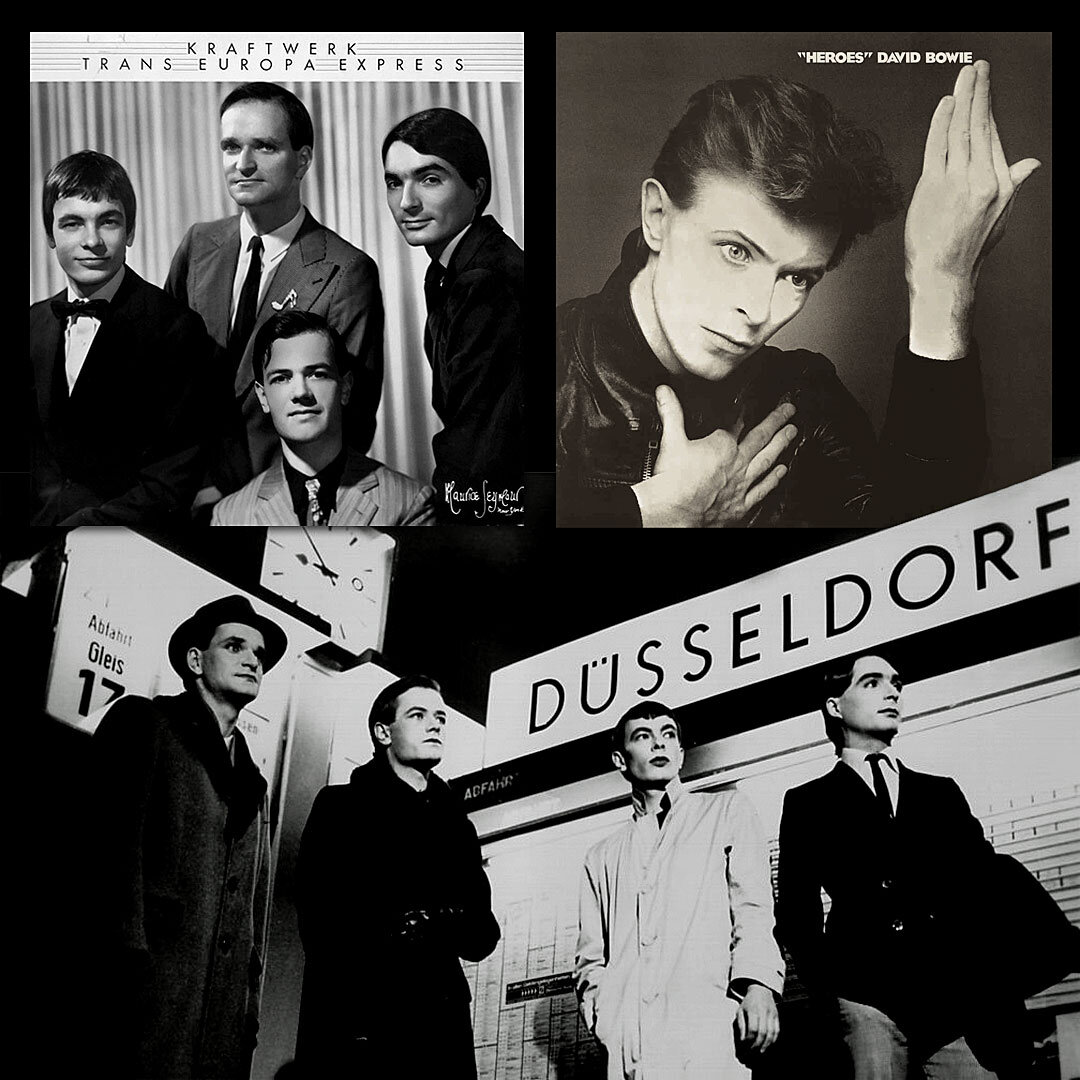“From station to station, back to Düsseldorf City, Meet Iggy Pop and David Bowie”
You've no doubt heard the sad news regarding the passing of Kraftwerk founder, Florian Schneider, aged 73. A spokesperson said he “passed away from a short cancer disease just a few days after his 73rd birthday”, his birthday being 7th April.
Schneider formed Kraftwerk with Ralf Hütter in 1970, and remained a member until his departure in 2008. He is pictured bottom left in our montage at Düsseldorf Hbf station with the rest of the band.
In a Kraftwerk feature for MOJO magazine Ralf Hütter responded to the question: “How important was David Bowie's infatuation with you?”, thus:
+ - + - + - + - + - + - + - + - + - + - + - + - +
“That was very important for us, because it linked what we were doing with the rock mainstream. Bowie used to tell everyone that we were his favourite group, and in the mid-'70s the rock press used to hang on every word from his mouth. We met him when he played Düsseldorf (April 8th 1976) on one of his first European tours. He was travelling by Mercedes, listening to nothing but Autobahn all the time.” (Keep reading for David's comment on the accuracy of the latter observation.)
+ - + - + - + - + - + - + - + - + - + - + - + - +
In 1978 Bowie recalled the meeting in an interview:
“I like them as people very much, Florian in particular. Very dry. When I go to Düsseldorf they take me to cake shops, and we have huge pastries. They wear their suits. A bit like Gilbert and George, actually, God, whatever happened to those two? I used to really like them... When I came over to Europe – cause it was the first tour I ever did of Europe (1976), the last time – I got myself a Mercedes to drive myself around in, cause I still wasn’t flying at that time, and Florian saw it... He said, “What a wonderful car”, and I said, “Yes, it used to belong to some Iranian prince, and he was assassinated and the car went on the market, and I got it for the tour.” And Florian said, “Ja, car always lasts longer.” With him it all has that edge. His whole cold emotion/warm emotion, I responded to that. Folk music of the factories.”
Kraftwerk immortalised the Düsseldorf meeting on the title track of the band’s 1977 album, Trans-Europe Express (see today’s lyric quotation), even including a shot of David and Iggy in the original German language video for the single.
David returned the compliment later the same year on the "Heroes" album, when he paid Florian the ultimate tribute by using his name for the title of V-2 Schneider.
Bowie also spoke in some depth about Kraftwerk in an UNCUT interview several years back. We reprinted the full unedited version of it on DavidBowie.com at the time and we’ll leave you with some of the relevant bits...
+ - + - + - + - + - + - + - + - + - + - + - + - +
UNCUT: Many reasons have been suggested for moving to Berlin: the local art and music scene, to escape superstardom, for spiritual and physical detox - plus the creative stimulation of being in an isolated, edgy, divided city. Are these theories accurate? Can you remember why the city appealed?
DB: Life in LA had left me with an overwhelming sense of foreboding. I had approached the brink of drug induced calamity one too many times and it was essential to take some kind of positive action. For many years Berlin had appealed to me as a sort of sanctuary like situation. It was one of the few cities where I could move around in virtual anonymity. I was going broke; it was cheap to live. For some reason, Berliners just didn't care. Well, not about an English rock singer anyway.
Since my teenage years I had obsessed on the angst ridden, emotional work of the expressionists, both artists and film makers, and Berlin had been their spiritual home. This was the nub of Die Brücke movement, Max Rheinhardt, Brecht and where Metropolis and Caligari had originated. It was an art form that mirrored life not by event but by mood. This was where I felt my work was going. My attention had been swung back to Europe with the release of Kraftwerk’s Autobahn in 1974. The preponderance of electronic instruments convinced me that this was an area that I had to investigate a little further.
Much has been made of Kraftwerk’s influence on our Berlin albums. Most of it lazy analyses I believe. Kraftwerk’s approach to music had in itself little place in my scheme. Theirs was a controlled, robotic, extremely measured series of compositions, almost a parody of minimalism. One had the feeling that Florian and Ralf were completely in charge of their environment, and that their compositions were well prepared and honed before entering the studio. My work tended to expressionist mood pieces, the protagonist (myself) abandoning himself to the 'zeitgeist' (a popular word at the time), with little or no control over his life. The music was spontaneous for the most part and created in the studio.
In substance too, we were poles apart. Kraftwerk’s percussion sound was produced electronically, rigid in tempo, unmoving. Ours was the mangled treatment of a powerfully emotive drummer, Dennis Davis. The tempo not only 'moved' but also was expressed in more than 'human' fashion. Kraftwerk supported that unyielding machine-like beat with all synthetic sound generating sources. We used an R&B band. Since 'Station To Station' the hybridization of R&B and electronics had been a goal of mine. Indeed according to a 70s’ interview with Brian Eno, this is what had drawn him to working with me.
One other lazy observation I would like to point up, btw, is the assumption that 'Station To Station' was homage to Kraftwerk's 'Trans-Europe Express'. In reality 'Station To Station' preceded ''Trans-Europe Express' by quite some time, 76 and 77 respectively.
Btw, the title drives from the Stations of the Cross and not the railway system.
What I WAS passionate about in relation to Kraftwerk was their singular determination to stand apart from stereotypical American chord sequences and their wholehearted embrace of a European sensibility displayed through their music. This was their very important influence on me.
Interesting sidebar. My original top of my wish list for guitar player on LOW was Michael Rother, from Neu!. Neu! being passionate, even diametrically opposite to Kraftwerk.
I phoned Rother from France in the first few days of recording but in the most polite and diplomatic fashion he said 'No'.
UNCUT: Was there ever a serious plan to record with Kraftwerk, as some biographers claim?
DB: No, not at any time. We met a few times socially but that was as far as it went.
UNCUT: Did you cruise the autobahns listening to 'Autobahn' non-stop, as Ralf Hütter once insisted?
DB: Certainly on the streets of LA in 1975, yes. But by Berlin Autobahn was rather last year’s news. So, in short , no.
UNCUT: Were there any meetings or planned collaborations with other 'Krautrock' bands like Cluster, Neu! or Tangerine Dream?
DB: Not at all. I knew Edgar Froese and his wife socially but I never met the others as I had no real inclination to go to Düsseldorf as I was very single minded about what I needed to do in the studio in Berlin. I took it upon myself to introduce Eno to the Düsseldorf sound with which he was very taken, Conny Plank et al (also to Devo btw who in turn had been introduced to me by Iggy) and Brian eventually made it up there to record with some of them.
UNCUT: 'V-2 Schneider' - a tribute to Florian?
DB: Of course.
+ - + - + - + - + - + - + - + - + - + - + - + - +
So long Florian.
#BowieKraftwerk

